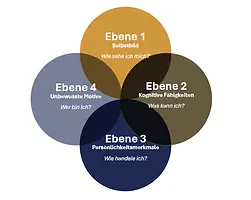

Potential diagnostics EPA PLUS: Scientific foundation
Our scientific standards in working with EPA PLUS
EPA PLUS uses a variety of methods to enable precise potential diagnostics. Each module was developed according to scientific standards so that the quality criteria of objectivity, reliability and validity are met to the extent required by science (e.g. Lienert & Raatz, 1998). Please feel free to contact us directly if you would like to take a look behind the scenes of our diagnostics and find out more about the individual components and their evaluation results.
Level 1
A person's self-image provides insight into their individual self-concept. To determine self-image, we use self-report questionnaires.
The large number of evaluated questionnaires ranges from willingness to perform, through the BIG 5, to self-confidence, communication skills and other task-specific questionnaires. All tests have been scientifically evaluated, checked for validity and achieve the minimum level of reliability required by research of r = .70.
Level 2
In the research tradition, time-based tests on specific skills have proven to be useful for assessing various facets of cognitive abilities. These have varying relevance depending on the context.
With EPAplus we can look at a wide range of skill areas, such as problem-solving skills, emotional intelligence or specific sales and commercial skills.
The available tests are validated and achieve a reliability of at least
r = .70
Level 3 + 4
Die Messung der unbewussten Ebenen - Persönlichkeitsmerkmale und impliziten Motive - wird durch den in Kooperation mit Hochschulen entwickelten Impliziten Persönlichkeitstest (IPT) ermöglicht. Modelle des Maschinenlernens, welche an umfangreichen Datensätzen trainiert wurden, ermöglichen eine objektive und direkte Auswertung.
Evaluationsstudien zeigen eine Interrater-Reliabilität von r = .71 bis r = .85 (Objektivität), eine Stabilität der Ergebnisse über ein Jahr (Retest-Reliabilität) sowie ein Aufklären von 20-50% der Gesamtvarianz von berufsrelevanten Kriterien (Validität).

The scientific background of EPA PLUS
"Recognizing different levels of personality gives us a clear view of a person's potential."
- Prof. Dr. David Scheffer
The requirement to offer scientifically based potential diagnostics is challenging. We are happy to take on this task in order to make more satisfaction in everyday life and work possible. We succeed in meeting the scientific requirement through cooperation with universities and colleges and continuous work on validation studies and practical case studies. The paper below by Prof. Dr. Dirk Johannßen, who currently works at the West Coast University of Applied Sciences, shows a research topic from the application of machine learning and artificial intelligence.
Since 2016, we have been accompanied on this path by the Nordakademie Elmshorn, University of Economics. Through close cooperation, the classic consideration of self-assessment and the measurement of cognitive abilities became possible to diagnose potential across 4 levels of personality. Companions here included Prof. Dr. David Scheffer, professor and head of the business psychology program, and Dr. Zahurul Islam for the field of artificial intelligence (natural language processing in AI).



Publications
Classification of German Jungian
Extraversion and Introversion Texts with
Assessment of Changes during the COVID-19 Pandemic
2022 | Dirk Johannßen, Chris Biemann, David Scheffer
Employee retention through AI: The importance of implicit motives and individual career programs in retaining high performers
2019 | Kerim Çekel, David Scheffer
